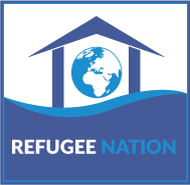
THE CRISIS
This figure includes 19.5 million refugees (people who have fled their home country) and over 38 million internally displaced people (those who have fled their homes, but have not yet crossed an international border - a "refugee in their own country").
THERE ARE 59.5 MILLION DISPLACED PEOPLE IN THE WORLD
Over half of all refugees and IDP's are children.
Only 1% of refugees are even considered for resettlement in another country each year, and only 4% of internally displaced people return to their homes each year. Despite returning, many face further persecution in their country of origin. Often times with demolished infrastructure, they are left to attempt to rebuild a life with the crumbs left over from war and a shattered economy.
Every 2.7 seconds, somewhere in the world a person is forced to leave their home, joining the tens of millions of IDP's and refugees across the globe.

There are over 50,000 organizations working around the world to aid refugees - this includes charities, non-profits, NGO's, social enterprises, and governments.
Since 1970, we have spent over $100 billion to try and address the refugee crisis. We currently spend over $27 million per day on relief and aid efforts for displaced people.
These funds are spent largely on humanitarian aid that goes to meeting basic needs - food, clean water, shelter, and emergency medical care. Very little funds go towards long-term or systemic changes in the way refugees are assisted.
61 countries work with the United Nations to address stateless people.
Countries cooperate to offer voluntary quota systems to take in refugees. The total number of spots, when you combine all countries, is 80,000, which acounts for less the 1/2 of 1 percent of all refugees.
Japan, one of the wealthiest and most stable countries in the world, accepted just 6 people for resettlement in 2013.
The average length of stay in a refugee camp is 17 years.
Your odds as a refugee of being trafficked, becoming a victim of sexual violence, or dying as opposed to finding a permanent home are 50:1
"More and more people are suffering, and unfortunately for many of them there is no chance to support them." [Antonio Guterres, the high counsel of the United Nations High Commission on Refugees]
86% of refugees end up in developing countries that are unable or unwilling to help them find a permanent home.
The top five host countries by number of refugees camped inside their borders are:
1 Turkey
2 Pakistan
3 Lebanon
4 Iran
5 Ethiopia

The numbers that describe this crisis are overwhelming, and the current solutions being provided are hardly measuring up to any standard of scalable functioning for the displaced people around the world.
But we believe there is a clear, decisive, and final way to provide a safety net for all refugees around the world.

© 2015 Refugee Nation


